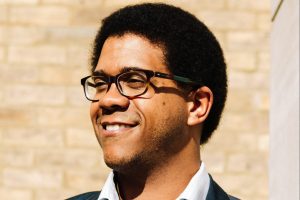Why the future of Ambitious Futures is still bright
The future is bright. Three former trainees - Kim, Josh, and Robyn - share how participating in Ambitious Futures continues to shape their careers. They also offer their views on why Higher Education needs to invest in the scheme, now more than ever.

The impact of Ambitious Futures
Ambitious Futures is the graduate training programme for University Leadership. Trainees work on strategic projects at two contrasting HEIs across a variety of departments. It is this diversity of experience which proved to be one of the greatest benefits for us.
We cultivated a holistic perspective on the challenges facing the sector. Our confidence and skills grew swiftly as we were continually pushed outside our comfort zone. We quickly learnt how to productively challenge the status quo and bring fresh ideas to the table, resulting in great benefit to our institutions.
The rotational nature of the scheme cultivated open mindedness about our careers from day one. For most, the ten year career plan is a thing of the past. In a landscape which is volatile, uncertain, complex and ambiguous (VUCA), being open to chance events and opportunities, rather than creating a defined plan, is the new normal.
 Kim Bailey (Ambitious Futures 2012-13) is a Careers Consultant at the University of Manchester:
Kim Bailey (Ambitious Futures 2012-13) is a Careers Consultant at the University of Manchester:
“My open-minded approach to developing a flexible and rewarding career in HE, developed during Ambitious Futures, continues to be a key strategy in my career development.
Last year, I was seconded to manage our UK alumni volunteering programmes. Although I had no experience working with this stakeholder group, I thrived in post because of my ability to hit the ground running in new environments and quickly make an impact.”
The future of work is flexible
Today’s emerging workforce seeks a varied and diverse career.
We are predicted to have more job and career changes than ever before. Continuous upskilling and reskilling will be key for employees and will undoubtedly benefit our institutions.
Universities need to use their resources flexibly, moving highly talented and committed individuals at pace to work on a variety of projects, often outside their job description.
 Josh Sendall (Ambitious Futures 2017-2018) is the Research & Scholarly Communications Manager at Lancaster University:
Josh Sendall (Ambitious Futures 2017-2018) is the Research & Scholarly Communications Manager at Lancaster University:
“The programme cultivated a strategic and intrapreneurial acumen in me which has proven indispensable as my career progressed.
Leading complex multi-stakeholder projects enabled me to work collaboratively and consultatively, often in partnership with other Professional Service areas and Academic colleagues.
I also gained exposure to strategic thinking and executive leadership at the highest level. This stimulated bigger picture thinking, and the ability to make synergistic links between my role and the university’s strategic mission.
It also reinforced the importance of investing in relationships across, and beyond, the institution to effectively navigate the VUCA environment and generate value for my university.”
A culture of lifelong learning
This pace of change means that a commitment to continuous professional development is central to success. The Ambitious Futures programme provides this in spades.
Trainees take part in action learning sets, and undertake leadership and management qualifications. Strong networks are built across the sector with other trainees and problem-solving skills are developed.
 Robyn Fitzharris (Ambitious Futures 2015-16) is the Executive Officer (Education) at Brunel University London:
Robyn Fitzharris (Ambitious Futures 2015-16) is the Executive Officer (Education) at Brunel University London:
“My experience of engaging with other trainees was hugely valuable. I had access to a network across the UK who I could contact for help and advice with all sorts of topics. It also provided space to receive support related to the challenges of starting fresh on a new project or in a new department.
When I face challenges in my work today, I think back to my time on the scheme and the coaching I received. I learnt that we don’t always need to know all of the answers right from the start. With time, flexibility, and perseverance you can make real change.”
Harnessing graduate talent
Our graduates are in high demand and for good reason.
We produce incredible talent. We need to attract, capture, and retain that talent.
However, we face serious competition from commercial organisations and the public sector alike. The Civil Service, Police Now, Network Rail, and the NHS (a list that goes on), all have well established graduate programmes.
They actively promote themselves as attractive employers through cohesive marketing campaigns across multiple platforms. The Ambitious Futures Programme provides an equivalent proposition with significant mutual benefits for trainees and partner institutions.
Ambitious Futures has produced 195 skilled, resilient, flexible and agile trainees across seven cohorts. On average, 85% of Trainees went on to secure roles within the HE sector.
In 2019, the Ambitious Futures programme won ‘Outstanding Contribution to Leadership Development,’ at the Times Higher Education Awards. This recognised its unique place in developing future HE leaders. The judges found that “this innovative approach helps to develop personal resilience, adaptability and emotional intelligence in high-achieving graduates.”
The scheme had an incredible impact on our individual careers for which we will always be grateful. We strongly believe that the sector cannot afford to lose sight of the latent potential it holds for future trainees, and the future of our universities.
Kim Bailey (Ambitious Futures 2012-13) is a Careers Consultant at the University of Manchester. Josh Sendall (Ambitious Futures 2017-2018) is the Research & Scholarly Communications Manager at Lancaster University. Robyn Fitzharris (Ambitious Futures 2015-16) is the Executive Officer (Education) at Brunel University London.
Related Blogs


